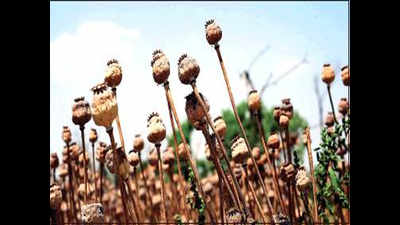- News
- City News
- jaipur News
- Rajasthan farmers caught in ‘opium crisis’
Trending
This story is from April 11, 2019
Rajasthan farmers caught in ‘opium crisis’

Picture used for representational purpose only
Generations of old cultivators growing ‘black gold’ in Jhalawar have been forced to give up the traditional crop, once considered the most rewarding, and shift to others such as coriander, citrus fruits and garlic.
This obviously has not gone down well with the farming community.
According to data, out of the 17,000 farmers who have been given permission to grow opium in the state, some 1,700 are from Jhalawar.Apart from Jhalawar, opium cultivation is restricted to the districts of Bhilwara, Udaipur, Kota, Chittorgarh and Pratapgarh.
“At one point, opium was cultivated by farmers in every village of the district. Now, stringent laws have forced a number of farmers to shift to coriander, citrus fruits, garlic and even ‘ashwagandha’, a medicinal plant. These crops do not generate the same income as opium, which has irked the farmers,” says an official of the agriculture department.
“The cultivation of opium requires tight safety and security. The crop is also dependent on climate. It now yields fewer benefits also due to stringent laws,” says Rajesh Tarwan, an opium grower from the Pachpahad area of Jhalawar district.
Tarwan’s family, which has been growing opium for the last many decades, is planning to shift from the crop to coriander or citrus fruits.
The Central Bureau of Narcotics (CBN) issues statutory licences to cultivate opium under strict laws. Only CBN can procure it from cultivators for a price, ranging from Rs 1,000 to Rs 7,000 a kg, depending on the quality. The sale in the open market is a punishable offence. The poppy husk, a leftover from the main crop, sells for around Rs 250 to Rs 2,500 per kg, depending on the quality.
Since the central government banned the consumption of poppy husk in 2016 and followed it up by a ban on the possession of husk under the Narcotic Drugs and Psychotropic Substances Act, the main income of opium farmers has fallen. As per the new rule, the leftovers have to be burnt or destroyed in the presence of an officer.
According to Jhalawar district opium officer Niranjan Guru, the number of farmers cultivating opium has drastically gone down. “Increasing number of farmers are continuously shifting to other crops,” he says.
This obviously has not gone down well with the farming community.
According to data, out of the 17,000 farmers who have been given permission to grow opium in the state, some 1,700 are from Jhalawar.Apart from Jhalawar, opium cultivation is restricted to the districts of Bhilwara, Udaipur, Kota, Chittorgarh and Pratapgarh.
“At one point, opium was cultivated by farmers in every village of the district. Now, stringent laws have forced a number of farmers to shift to coriander, citrus fruits, garlic and even ‘ashwagandha’, a medicinal plant. These crops do not generate the same income as opium, which has irked the farmers,” says an official of the agriculture department.
“The elected representatives have failed to support us and take up our cause,” says Sanjay Kumar Dangi, a farmer from Chawali village of Pidawa area in Jhalawar.
“The cultivation of opium requires tight safety and security. The crop is also dependent on climate. It now yields fewer benefits also due to stringent laws,” says Rajesh Tarwan, an opium grower from the Pachpahad area of Jhalawar district.
Tarwan’s family, which has been growing opium for the last many decades, is planning to shift from the crop to coriander or citrus fruits.
The Central Bureau of Narcotics (CBN) issues statutory licences to cultivate opium under strict laws. Only CBN can procure it from cultivators for a price, ranging from Rs 1,000 to Rs 7,000 a kg, depending on the quality. The sale in the open market is a punishable offence. The poppy husk, a leftover from the main crop, sells for around Rs 250 to Rs 2,500 per kg, depending on the quality.
Since the central government banned the consumption of poppy husk in 2016 and followed it up by a ban on the possession of husk under the Narcotic Drugs and Psychotropic Substances Act, the main income of opium farmers has fallen. As per the new rule, the leftovers have to be burnt or destroyed in the presence of an officer.
According to Jhalawar district opium officer Niranjan Guru, the number of farmers cultivating opium has drastically gone down. “Increasing number of farmers are continuously shifting to other crops,” he says.
End of Article
FOLLOW US ON SOCIAL MEDIA










